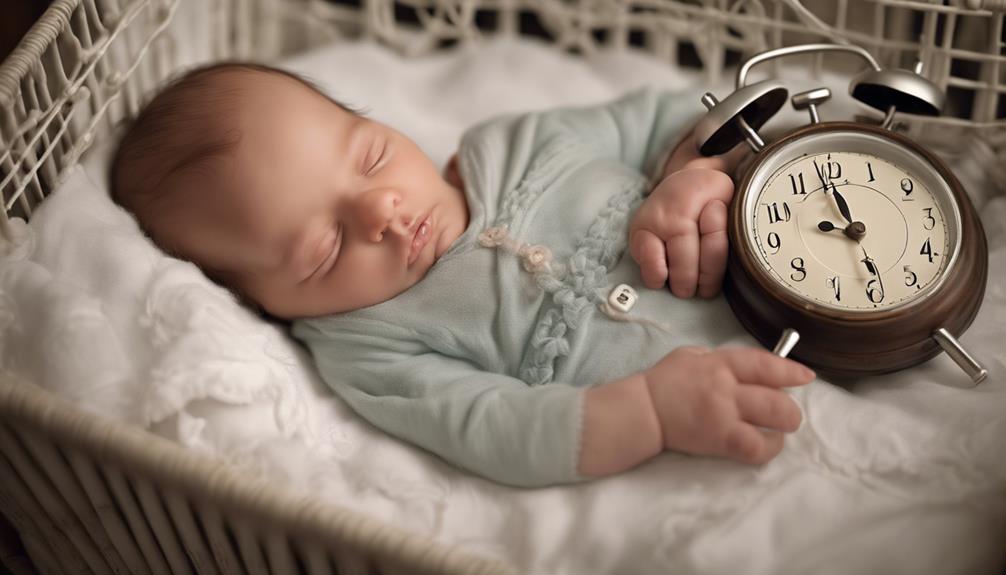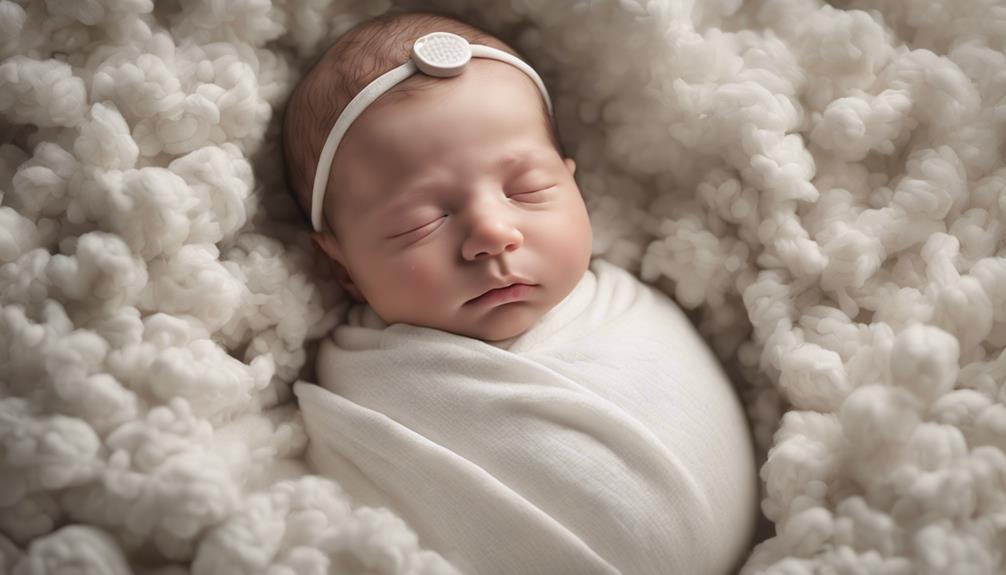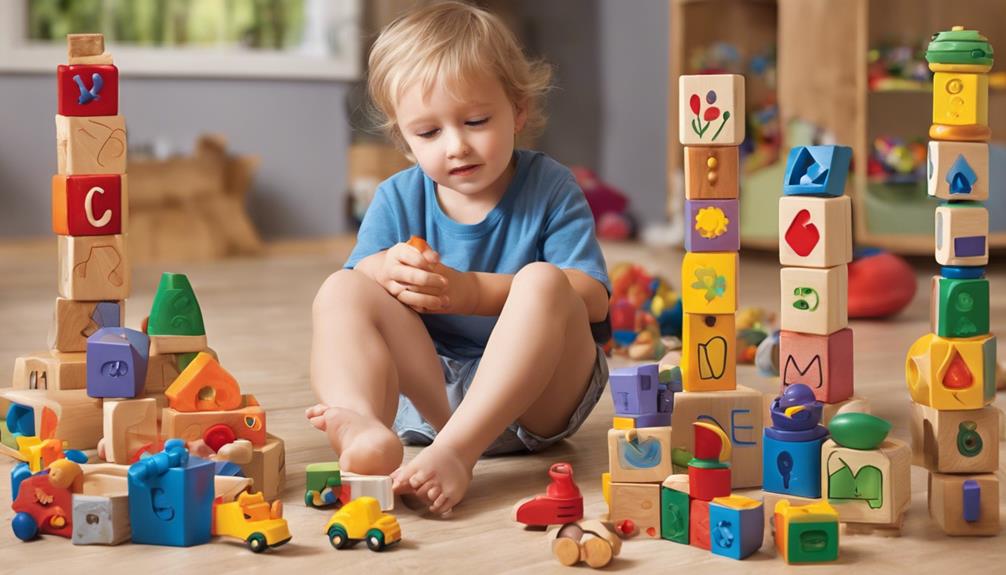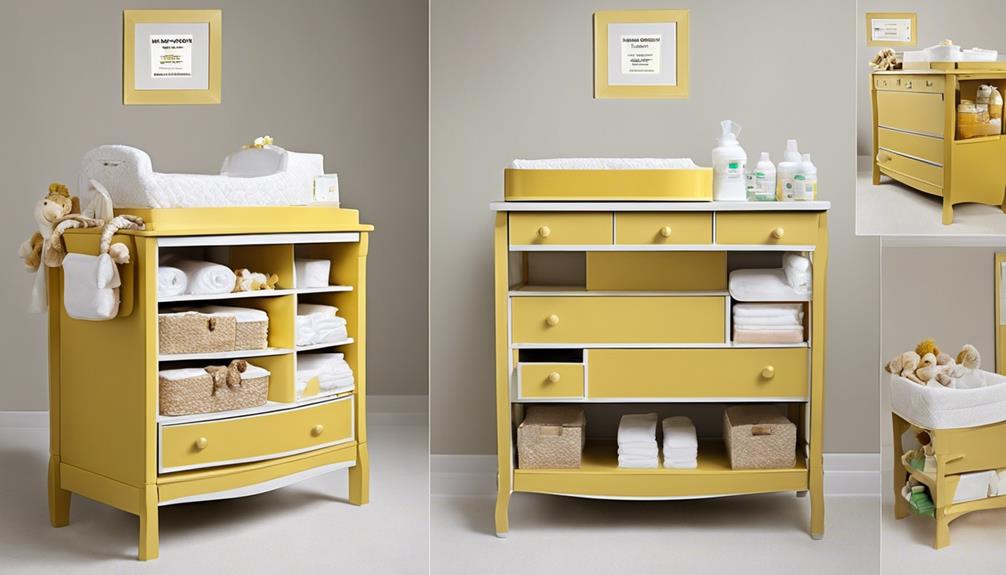If you're steering through the sea of newborn care, you may find yourself adrift in the waves of uncertainty when your little one's hiccups become a frequent companion. But fear not, for understanding the rhythm of these tiny interruptions can provide solace and guidance in the quest for calm waters.
So, before you wade into uncharted territories of sleepless nights and endless searches for remedies, let's explore the hidden currents behind your newborn's persistent hiccups and discover the anchor points to help you steer this journey with confidence and ease.
Key Takeaways
- Newborn hiccups stem from diaphragm immaturity and reflex challenges.
- Hiccups can occur frequently, lasting over 10 minutes, but usually resolve quickly.
- Remedies include burping, pacifiers, upright positioning, and gripe water drops.
- Seek medical advice for persistent hiccups, sleep disturbances, or feeding issues.

Comfy Cubs Muslin Burp Cloths 20" x 10", Pack of 10 – Large, 6-Layer, Ultra Absorbent 100% Cotton for Baby Drool and Messes – Soft, Safe & Gentle Baby Burp Cloths for Boys & Girls – Multi
Soft and Gentle Baby Burp Cloths: Made from 100% breathable muslin cotton, these burping cloths are lightweight, gentle,…
As an affiliate, we earn on qualifying purchases.
As an affiliate, we earn on qualifying purchases.
Common Causes of Newborn Hiccups
Newborn hiccups often stem from the immaturity of their diaphragm and the sensitive control of their nerves. Babies, especially premature infants, may experience hiccups more frequently due to challenges in reflex maturation and coordination. Factors like swallowing air during feedings or the Tonic Neck Reflex can trigger these episodes. Understanding the common causes of newborn hiccups can help you prevent and manage them effectively.
Babies' reflex maturation plays an important role in the occurrence of hiccups as their nerves learn to coordinate with the diaphragm. Premature infants, in particular, face difficulties in this coordination, making them more susceptible to hiccups. Additionally, rapid feedings or gulping milk too quickly can lead to swallowing air, irritating the diaphragm and causing hiccups. By ensuring a calm feeding environment and burping your baby frequently during meals, you can help reduce the likelihood of hiccups. Your attentiveness to these triggers will aid in easing your newborn's discomfort and promoting a peaceful feeding experience.

Philips Avent Soothie Baby Pacifiers – 100% Silicone Pacifiers for Babies 0-3 Months, One-Piece Design, BPA-Free, Extra Durable, Green, 4 Pack, Model SCF190/41
Newborn pacifier 0-3 months supporting baby’s natural suckling need: designed to fulfill newborns' natural suckling reflex to self-soothe…
As an affiliate, we earn on qualifying purchases.
As an affiliate, we earn on qualifying purchases.
Duration and Frequency of Newborn Hiccups

If your newborn experiences hiccups, it's crucial to understand the typical duration and frequency of these episodes to differentiate between normal occurrences and potential concerns. Newborns can have hiccups multiple times a day, and these episodes may last for 10 minutes or longer.
It's vital to note that some newborns may experience hiccups more frequently than others. Fortunately, hiccups in newborns often resolve on their own after a few minutes. However, if you notice prolonged or frequent hiccups in your baby, it may be necessary to seek consultation with a healthcare provider.
By recognizing the normal duration and frequency of newborn hiccups, caregivers can better distinguish between typical and concerning episodes. Remember, if you have any doubts or if the hiccups seem excessive or distressing, it's always best to consult with your healthcare provider for guidance and reassurance.
Your baby's well-being is a top priority, and seeking professional advice can provide you with the necessary support and peace of mind.

Mommy's Bliss Gripe Water Original, Infant Gas & Colic Relief, Gripe Water for Babies, Gentle & Safe, 2 Weeks+, 4 Fl Oz (Pack of 1)
MOMMY'S BLISS ORIGINAL GRIPE WATER: Mommy's Bliss Gripe Water is the bestselling supplement for infant gas and colic…
As an affiliate, we earn on qualifying purchases.
As an affiliate, we earn on qualifying purchases.
Effective Remedies for Newborn Hiccups

To alleviate newborn hiccups effectively, consider implementing simple remedies like burping your baby frequently during feedings. Babies often swallow air while feeding, causing hiccups. By burping them, you release these air bubbles, easing their discomfort.
Offering a pacifier can also help relax the diaphragm and potentially stop hiccups in newborns. Positioning your baby upright after feeding may aid in alleviating hiccups by preventing stomach contents from moving up, reducing the chances of hiccups.
Gripe water drops, under pediatrician guidance, can be considered as a remedy for newborn hiccups. Remember, as newborns grow older, the frequency of hiccups typically decreases naturally without intervention. By incorporating these simple remedies into your routine, you can provide comfort to your little one and ease their hiccups effectively.

Cococu Baby Head Pillow for Newborn, Soft Infant Head Support with Organic Cotton Cover, Breathable Ergonomic Baby Neck Support for Car Seat, Stroller & Bassinet, White
Soft & Comfortable: Ultra-soft, breathable fabric with gentle padding provides cozy baby head and neck support for everyday…
As an affiliate, we earn on qualifying purchases.
As an affiliate, we earn on qualifying purchases.
Preventing Newborn Hiccups

To prevent hiccups in your newborn, it's important to burp them frequently during feedings to release trapped air bubbles. This simple act can greatly reduce the occurrence of those pesky hiccups. Offering smaller, more frequent feedings can also help in preventing your baby from getting hiccups too often.
Overfeeding your little one can lead to stomach distention and, consequently, hiccups, so be mindful of the amount they're consuming. Keeping your newborn upright for a while after feedings can aid in digestion and minimize the chances of hiccups.
It's essential to create a calm and relaxed environment during feedings to help prevent hiccups from surfacing. By following these practices and expert advice, you can help your baby avoid unnecessary discomfort caused by hiccups.
When to Seek Medical Advice for Hiccups

In some cases, seeking medical advice for your newborn's hiccups may be necessary. While hiccups are usually harmless, if they persist for 5-10 minutes or greatly affect your baby's sleep or behavior, it's a good idea to consult a healthcare provider.
Look out for other worrisome signs like vomiting or feeding refusal along with hiccups, as these could indicate an underlying issue. Preterm infants, in particular, may experience frequent hiccups, necessitating medical evaluation if concerns arise.
If your little one's hiccups are persistent or if you're worried about their frequency, seeking guidance from a healthcare professional can provide reassurance. Remember, hiccups can be caused by various factors like the immaturity of your baby's diaphragm or the vocal cords; however, simple steps like trying to burp your baby after feeds, as recommended by the American Academy of Pediatrics, can often help prevent hiccups or make them go away.
Your baby's well-being is paramount, and seeking medical advice when needed ensures their health and comfort.
Frequently Asked Questions
Is It Normal for My Newborn to Have Hiccups All the Time?
It's normal for your newborn to have hiccups all the time. Their developing diaphragm and immature nervous system can trigger frequent hiccups, often linked to feeding. As your baby grows, hiccups usually decrease.
How Do I Stop My Baby From Having Constant Hiccups?
To stop your baby from having constant hiccups, try burping them often, holding them upright during feedings, offering a pacifier, keeping them calm, and consulting their healthcare provider for personalized advice.
Is It Normal to Feel Baby Hiccups Everyday?
It's completely normal to feel your baby's hiccups every day. Their developing diaphragm and feeding habits can lead to frequent hiccups. As long as they're not accompanied by other concerning symptoms, daily hiccups are typically harmless and will decrease over time.
How Do I Get Rid of Hiccups After Feeding My Baby?
To get rid of hiccups after feeding your baby, burp them, change their position, offer a pacifier, gently rub their back, and avoid overfeeding. These actions can help release trapped air, relax the diaphragm, and aid digestion to reduce hiccups.
Conclusion
To summarize, understanding why your newborn always has hiccups can help you better manage and prevent them. By following the tips outlined in this guide, you can help alleviate your baby's discomfort and promote their well-being.
Remember, just like a hiccup in a story that eventually fades away, with patience and care, your newborn's hiccups will also pass. Trust your instincts and seek medical advice if needed for peace of mind.









